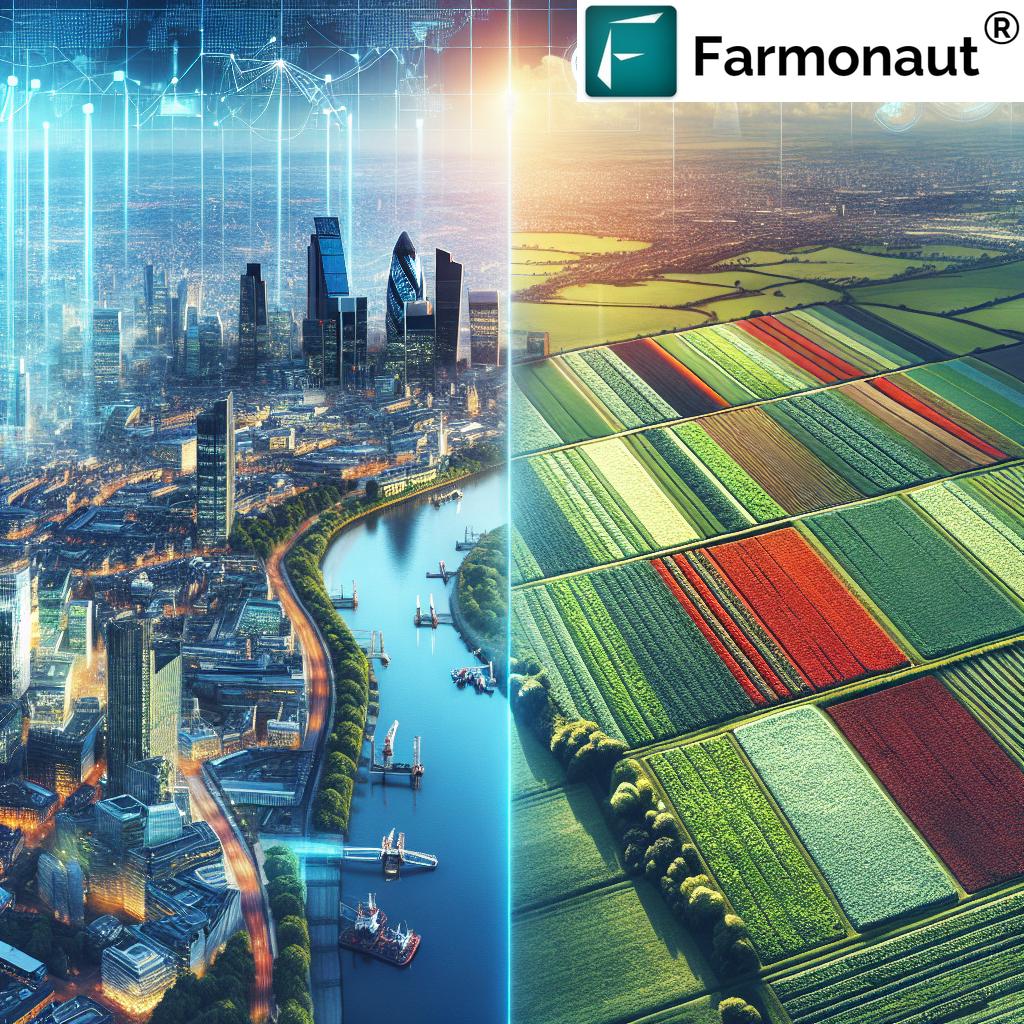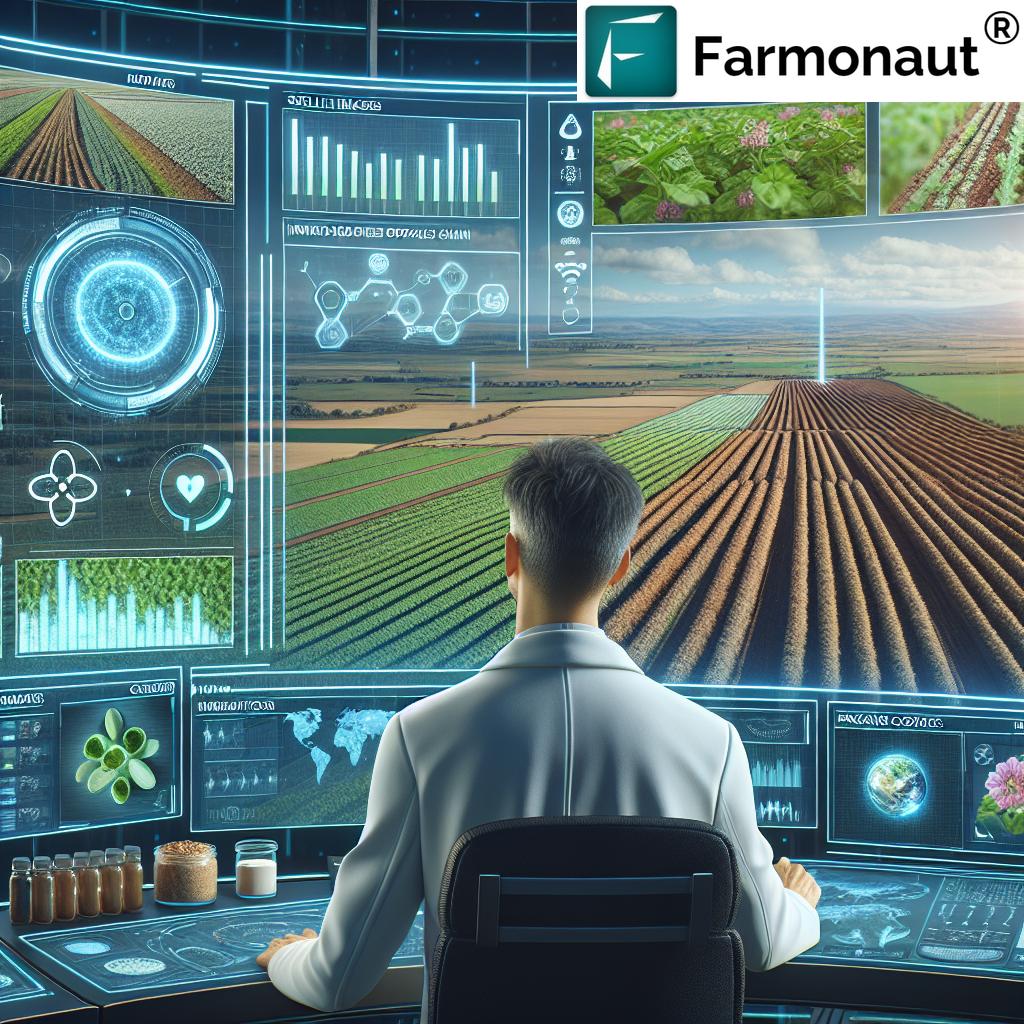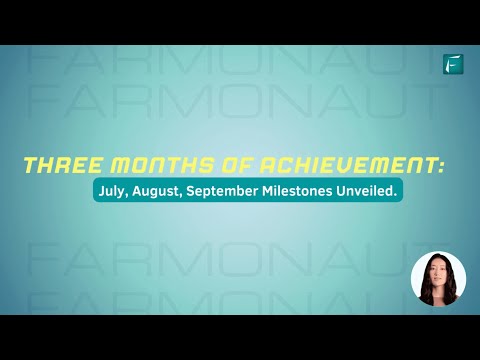Revolutionizing London’s Agritech: How Precision Agriculture and Sustainable Farming Boost Financial Performance
“Satellite crop monitoring can increase crop yields by up to 20% while reducing water usage by 30%.”
In the heart of London’s bustling financial district, a quiet revolution is taking place. It’s not happening on the trading floors or in the boardrooms of the City, but in the fields and farms that surround our great metropolis. We’re witnessing the dawn of a new era in agriculture, one where precision agriculture technology and sustainable farming practices are transforming the way we grow food and manage our natural resources.
As experts in the field of agricultural technology and sustainable farming, we at Farmonaut are at the forefront of this revolution. Our mission is to make precision agriculture accessible and affordable to farmers worldwide, and we’re excited to share our insights on how these innovations are boosting financial performance in London’s agritech sector.
The Rise of Precision Agriculture in London
London, known for its rich history and financial prowess, is now emerging as a hub for agricultural innovation. The convergence of technology and farming has given birth to a new breed of agriculture – one that is data-driven, efficient, and environmentally conscious.
- Satellite Crop Monitoring: Advanced imaging technologies allow farmers to keep a close eye on their crops from space.
- IoT Sensors: Internet of Things devices provide real-time data on soil conditions, weather, and crop health.
- AI and Machine Learning: These technologies analyze vast amounts of data to provide actionable insights for farmers.
These advancements are not just technological marvels; they’re financial game-changers. By optimizing resource use and maximizing yields, precision agriculture is dramatically improving the bottom line for London’s farmers and agribusinesses.

Sustainable Farming: The New Norm in London’s Agriculture
Sustainability is no longer just a buzzword; it’s a necessity. London’s farmers are increasingly adopting sustainable farming practices that not only benefit the environment but also improve their financial performance.
- Reduced Water Usage: Precision irrigation systems cut water waste by up to 30%.
- Optimized Fertilizer Application: Targeted application reduces costs and environmental impact.
- Integrated Pest Management: Biological controls and data-driven interventions minimize pesticide use.
These practices are not just good for the planet; they’re good for profits too. By reducing input costs and improving efficiency, sustainable farming is helping London’s agricultural sector thrive in an increasingly competitive global market.
The Financial Impact of Agritech in London
The adoption of precision agriculture and sustainable farming practices is having a profound impact on the financial performance of London’s agricultural sector. Let’s break down the numbers:
- Increased Yields: Precision agriculture techniques can boost crop yields by up to 20%.
- Reduced Input Costs: Smart resource management can cut input costs by 15-25%.
- Higher Quality Produce: Better crop management leads to premium pricing for higher quality goods.
These improvements are not just theoretical. Real farms in and around London are seeing tangible benefits to their bottom line. For instance, a vegetable farm in Surrey reported a 30% increase in profits after implementing precision irrigation and nutrient management systems.
Farmonaut’s Role in London’s Agritech Revolution
At Farmonaut, we’re proud to be part of this exciting transformation. Our satellite-based farm management solutions are helping London’s farmers make the leap into precision agriculture. Here’s how:
- Real-time Crop Health Monitoring: Our satellite imagery provides up-to-date information on crop health, allowing for timely interventions.
- AI-powered Advisory System: Our Jeevn AI system offers personalized recommendations based on real-time data and expert knowledge.
- Blockchain-based Traceability: We’re enhancing supply chain transparency, a crucial factor for London’s discerning consumers.
To learn more about how Farmonaut can help revolutionize your farming practices, check out our web app or download our mobile apps:
The Future of Agritech in London
As we look to the future, the potential for agritech in London is boundless. Here are some trends we’re keeping an eye on:
- Vertical Farming: Urban agriculture solutions that maximize space in the city.
- Gene Editing: Precision breeding techniques for more resilient and productive crops.
- Robotics and Automation: Reducing labor costs and increasing efficiency in farming operations.
These innovations promise to further enhance the financial performance of London’s agricultural sector while promoting sustainability and food security.
Comparing Traditional and Precision Agriculture in London
To truly understand the impact of precision agriculture, let’s compare it with traditional farming methods:
| Farming Aspect | Traditional Methods | Precision Agriculture |
|---|---|---|
| Crop Yield (estimated tons/hectare) | 7-9 | 9-11 |
| Water Usage (estimated liters/hectare) | 6,000-8,000 | 4,000-5,000 |
| Fertilizer Efficiency (estimated %) | 40-50% | 60-70% |
| Soil Health Monitoring | Periodic manual testing | Continuous IoT sensor monitoring |
| Pest Management | Scheduled spraying | Targeted, as-needed application |
| Labor Hours (estimated hours/week) | 50-60 | 30-40 |
| Environmental Impact | Higher resource use, more runoff | Reduced resource use, minimal runoff |
As the table clearly shows, precision agriculture offers significant advantages across all aspects of farming. These improvements translate directly into better financial performance and sustainability.
“Precision agriculture technology has the potential to reduce fertilizer use by 15-20% globally.”
The Role of Data in Agritech Financial Analysis
In the age of big data, information is power. Agritech financial analysis is revolutionizing how farmers and investors make decisions. Here’s how:
- Predictive Analytics: AI algorithms can forecast crop yields and market prices with increasing accuracy.
- Risk Assessment: Advanced modeling helps farmers and insurers better understand and mitigate agricultural risks.
- Supply Chain Optimization: Data-driven insights improve logistics and reduce waste in the supply chain.
By leveraging these data-driven insights, London’s agribusinesses are making smarter decisions and achieving better financial outcomes.
Organic Farming and Data Solutions
The organic farming sector in London is also benefiting from technological advancements. Organic farming data solutions are helping farmers maintain their organic certifications while improving yields and profitability.
- Compliance Tracking: Digital systems ensure adherence to organic standards throughout the growing process.
- Pest and Disease Prediction: AI models help organic farmers anticipate and prevent pest outbreaks without chemical interventions.
- Soil Health Management: Advanced sensors and analytics optimize organic soil amendments and crop rotations.
These solutions are enabling London’s organic farmers to compete more effectively in the market while maintaining their commitment to sustainable practices.

The Impact on Agricultural Supply Chain Management
Agricultural supply chain management is undergoing a transformation thanks to precision agriculture and data analytics. Here’s how it’s affecting London’s food system:
- Improved Traceability: Blockchain technology allows consumers to trace their food from farm to fork.
- Reduced Food Waste: Better forecasting and inventory management minimize spoilage and overproduction.
- Streamlined Logistics: IoT devices and AI optimize transportation and storage of agricultural products.
These improvements are not only boosting efficiency but also enhancing food safety and consumer trust in London’s agricultural products.
Vegan Cosmetics: A Growing Sector in London’s Agritech Scene
An unexpected beneficiary of the agritech revolution in London is the vegan cosmetics production sector. As consumer demand for plant-based and cruelty-free products grows, agritech is playing a crucial role:
- Sustainable Ingredient Sourcing: Precision agriculture ensures a steady supply of high-quality plant-based ingredients.
- Quality Control: Advanced analytics ensure consistency and purity in botanical extracts.
- Supply Chain Transparency: Blockchain technology allows vegan cosmetics brands to verify the authenticity of their ingredients.
This intersection of agritech and cosmetics is creating new opportunities for London’s farmers and entrepreneurs alike.
The Role of Satellite Crop Monitoring in London’s Agriculture
Satellite crop monitoring is a game-changer for London’s farmers. Here’s how it’s making a difference:
- Early Problem Detection: Satellite imagery can spot crop health issues before they’re visible to the naked eye.
- Precision Resource Application: Detailed maps guide the precise application of water, fertilizers, and pesticides.
- Yield Prediction: Advanced algorithms can forecast yields with increasing accuracy, helping with financial planning.
At Farmonaut, we’re proud to offer cutting-edge satellite crop monitoring services. To learn more about how our technology can benefit your farm, visit our web app or explore our API for custom integrations.
Farm Management Software: The Digital Brain of Modern Agriculture
In London’s evolving agricultural landscape, farm management software has become indispensable. These digital tools are the central nervous system of modern farms, integrating data from various sources and providing actionable insights. Here’s how they’re transforming farm operations:
- Centralized Data Management: All farm data, from soil sensors to satellite imagery, is accessible in one place.
- Automated Record-Keeping: Digital logs simplify compliance and certification processes.
- Decision Support: AI-powered recommendations help farmers make informed choices about planting, harvesting, and resource allocation.
By streamlining operations and enhancing decision-making, farm management software is significantly boosting the financial performance of London’s farms.
Agricultural Market Trends in London
Understanding agricultural market trends is crucial for farmers and investors alike. In London, we’re seeing several key trends emerge:
- Growing Demand for Local Produce: Consumers are increasingly valuing locally grown food, creating opportunities for urban and peri-urban farms.
- Rise of Specialty Crops: Niche markets for specialty and heritage varieties are expanding, offering premium pricing opportunities.
- Increased Focus on Sustainability: Environmentally friendly farming practices are becoming a market differentiator.
These trends are shaping investment decisions and driving innovation in London’s agritech sector.
The Environmental Impact of Precision Agriculture
While the financial benefits of precision agriculture are clear, its environmental impact is equally significant. Here’s how these technologies are promoting sustainability in London’s farming sector:
- Reduced Chemical Use: Targeted application of pesticides and fertilizers minimizes runoff and soil degradation.
- Water Conservation: Precision irrigation systems can reduce water usage by up to 30%.
- Soil Health Preservation: Data-driven crop rotation and tillage practices protect and enhance soil quality.
By adopting these practices, London’s farmers are not only improving their bottom line but also safeguarding the environment for future generations.
The Future of Agritech Financial Analysis
As we look to the future, agritech financial analysis is set to become even more sophisticated. Here are some developments we’re anticipating:
- Integration of Financial and Agronomic Data: More comprehensive models that consider both financial and agricultural factors.
- Real-Time Market Integration: Instant access to market data for more dynamic decision-making.
- Predictive Financial Modeling: Advanced AI that can forecast farm financial performance based on multiple variables.
These advancements will enable London’s farmers and agribusinesses to make even more informed financial decisions, further boosting the sector’s performance.
Conclusion: London’s Agritech Revolution
The revolution in London’s agritech sector is well underway, driven by precision agriculture technology, sustainable farming practices, and innovative financial analysis tools. As we’ve explored, these advancements are not just improving yields and efficiency; they’re transforming the entire agricultural landscape of our city.
From satellite crop monitoring to AI-powered farm management software, from blockchain-based supply chain solutions to sophisticated financial modeling, the tools available to London’s farmers and agribusinesses are more powerful than ever before. And with companies like Farmonaut making these technologies accessible and affordable, the future of London’s agriculture looks bright indeed.
As we move forward, the integration of technology and sustainable practices will continue to drive financial performance in the agricultural sector. By embracing these innovations, London’s farmers are not only securing their own financial future but also contributing to a more sustainable and food-secure world.
The agritech revolution is here, and London is leading the way. As we continue to innovate and adapt, we’re excited to see what the future holds for our city’s farms and the global agricultural community as a whole.
Farmonaut Subscriptions
Frequently Asked Questions
Q: What is precision agriculture?
A: Precision agriculture is a farming management concept that uses technology to observe, measure, and respond to variability in crops. It involves using tools like GPS guidance, control systems, sensors, robotics, drones, autonomous vehicles, variable rate technology, GPS-based soil sampling, and automated hardware to manage crops and optimize returns on inputs while preserving resources.
Q: How does satellite crop monitoring work?
A: Satellite crop monitoring uses images taken from satellites to assess crop health and field conditions. These images are analyzed using various spectral bands to create vegetation indices like NDVI (Normalized Difference Vegetation Index). This data helps farmers identify areas of stress in their fields, predict yields, and make informed decisions about irrigation, fertilization, and pest control.
Q: What are the financial benefits of adopting precision agriculture?
A: The financial benefits of precision agriculture include increased crop yields (up to 20% in some cases), reduced input costs (15-25% savings on water, fertilizer, and pesticides), improved quality of produce leading to better market prices, and overall increased profitability. Additionally, it can lead to more efficient use of labor and equipment.
Q: How does sustainable farming improve financial performance?
A: Sustainable farming improves financial performance by reducing input costs through efficient resource use, potentially commanding premium prices for environmentally friendly products, reducing long-term soil degradation costs, and improving farm resilience to climate change. It also often leads to reduced regulatory compliance costs and access to sustainability-focused markets and subsidies.
Q: What role does AI play in modern agriculture?
A: AI plays a crucial role in modern agriculture by analyzing vast amounts of data from various sources (satellites, sensors, weather stations, etc.) to provide actionable insights. It helps in predictive analysis for crop yields, pest and disease outbreaks, and market trends. AI also powers autonomous farm equipment, optimizes irrigation and fertilization schedules, and assists in crop selection based on market demands and environmental conditions.





